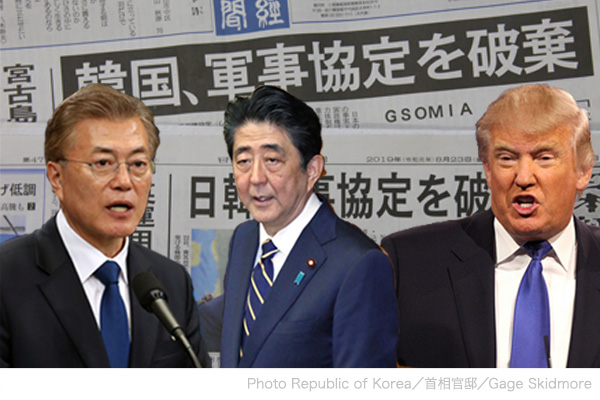The U.S. government has taken a definite position of strongly criticizing South Korean President Moon Jae In for deciding to terminate the General Security of Military Information Agreement with Japan, known as GSOMIA, in a manner to spread Seoul’s dispute with Tokyo to the military and security field. However, the U.S. Trump administration and congressional leaders may have yet to sufficiently understand Japan’s assertions regarding its deteriorating relations with South Korea. Tokyo is required to make more efforts to deepen Washington’s understanding about Japan’s position.
Washington objecting Seoul’s decision to end GSOMIA
“We are deeply disappointed and concerned,” U.S. State Department spokeswoman Morgan Ortagus said in the Trump administration’s official response to Seoul’s decision to end GSOMIA that has been useful for Japan and South Korea for sharing information primarily about North Korea’s military movement. The South Korean decision would “increase risk to U.S. forces,” she said.
Randall Schriver, assistant secretary of defense for Indo-Pacific security affairs, said in a speech, “We are concerned it may reflect serious misapprehension on the part of the Moon administration regarding the serious security challenges we face in Northeast Asia.” He called on Seoul to withdraw the decision.
At the just-ended Group of Seven summit in France, U.S. President Donald Trump branded Moon as unreliable, quoted North Korean leader Kim Jong Un as describing Moon as a liar and questioned why such person became president, according to multiple Japanese media reports. Trump might have indicated that he would not forgive anyone making a decision to pose danger to U.S. forces.
In a statement, U.S. House Foreign Affairs Committee Chairman Eliot L. Engel, a Democrat from New York, said he was “deeply concerned” about Seoul’s decision to terminate GSOMIA. “It is irresponsible to allow the escalating tensions to hinder practical national security-oriented cooperation,” he said, condemning Moon for the decision.
U.S. falls short of understanding Japan’s toughened export control
However, it should be noted that the U.S. does not necessarily side with Japan over the broader Japan-South Korea dispute. Washington has remained neutral over Japan’s exclusion of South Korea from a list of countries subject to preferential treatments regarding export control, which has led South Korea to take a similar action against Japan.
Schriver said that the Japanese and South Korean measures to strengthen export control against each other might have been “politically motivated.” “I think our preference would be that they, in fact, do remove one another and return to a more normal trading relationship,” he said.
Tokyo has explained that its decision to toughen export control came because Seoul refused to hold bilateral talks for appropriate export control and had “inadequate cases” regarding export control and that the decision was not a countermeasure or retaliatory action against the Moon administration’s inaction on South Korean Supreme Court rulings ordering Japanese companies to compensate former South Korean workers for their wartime labor in Japan. Shriver’s mentioning of political motivation apparently indicates that Tokyo’s explanation has failed to spread throughout the Trump administration.
“It is disappointing to see that the Japanese government has chosen to retaliate against South Korea using trade actions,” Engel said in his earlier statement, indicating that he took the Japanese export control action as a retaliation.
I wonder if the Japanese embassy in Washington has been shrewd enough in explaining the government’s position to have the Trump administration and Congress fully understand it.
Yasushi Tomiyama is a senior research fellow and Planning Committee member at the Japan Institute for National Fundamentals and a former foreign news editor and bureau chief in Washington, D.C., London and Bangkok for the Jiji Press.


